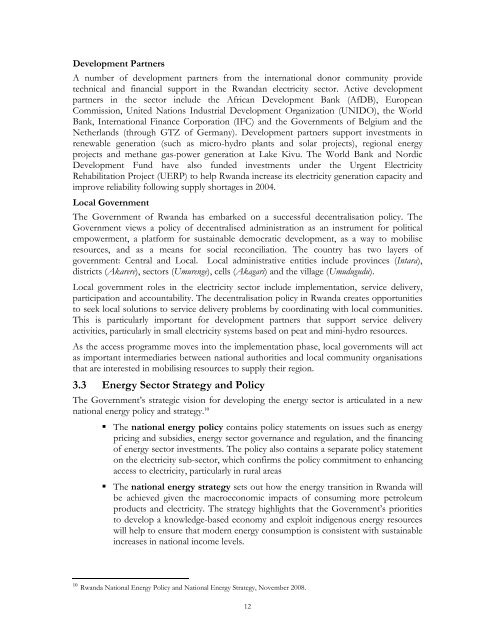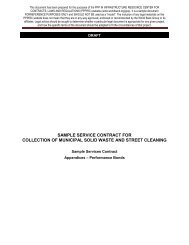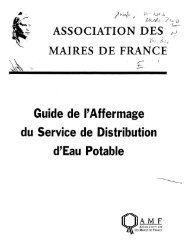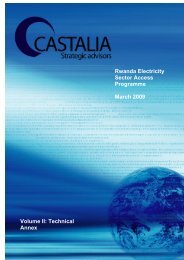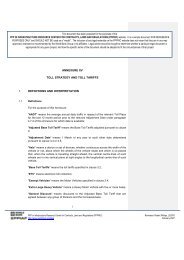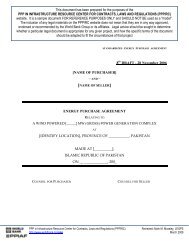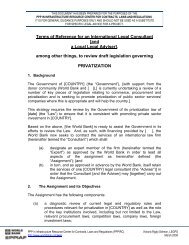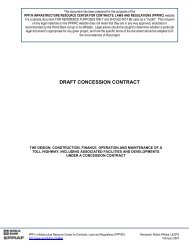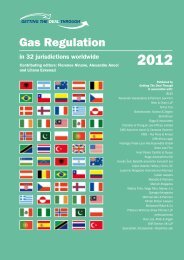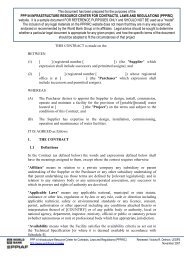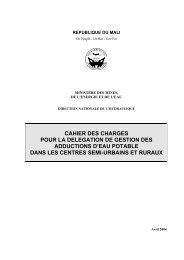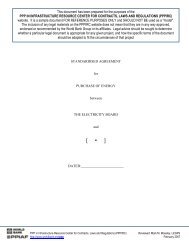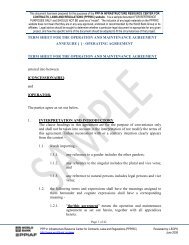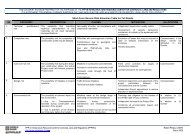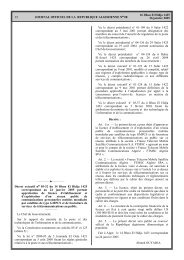Volume I: Investment Prospectus Rwanda Electricity Sector Access ...
Volume I: Investment Prospectus Rwanda Electricity Sector Access ...
Volume I: Investment Prospectus Rwanda Electricity Sector Access ...
- No tags were found...
You also want an ePaper? Increase the reach of your titles
YUMPU automatically turns print PDFs into web optimized ePapers that Google loves.
Development PartnersA number of development partners from the international donor community providetechnical and financial support in the <strong>Rwanda</strong>n electricity sector. Active developmentpartners in the sector include the African Development Bank (AfDB), EuropeanCommission, United Nations Industrial Development Organization (UNIDO), the WorldBank, International Finance Corporation (IFC) and the Governments of Belgium and theNetherlands (through GTZ of Germany). Development partners support investments inrenewable generation (such as micro-hydro plants and solar projects), regional energyprojects and methane gas-power generation at Lake Kivu. The World Bank and NordicDevelopment Fund have also funded investments under the Urgent <strong>Electricity</strong>Rehabilitation Project (UERP) to help <strong>Rwanda</strong> increase its electricity generation capacity andimprove reliability following supply shortages in 2004.Local GovernmentThe Government of <strong>Rwanda</strong> has embarked on a successful decentralisation policy. TheGovernment views a policy of decentralised administration as an instrument for politicalempowerment, a platform for sustainable democratic development, as a way to mobiliseresources, and as a means for social reconciliation. The country has two layers ofgovernment: Central and Local. Local administrative entities include provinces (Intara),districts (Akarere), sectors (Umurenge), cells (Akagari) and the village (Umudugudu).Local government roles in the electricity sector include implementation, service delivery,participation and accountability. The decentralisation policy in <strong>Rwanda</strong> creates opportunitiesto seek local solutions to service delivery problems by coordinating with local communities.This is particularly important for development partners that support service deliveryactivities, particularly in small electricity systems based on peat and mini-hydro resources.As the access programme moves into the implementation phase, local governments will actas important intermediaries between national authorities and local community organisationsthat are interested in mobilising resources to supply their region.3.3 Energy <strong>Sector</strong> Strategy and PolicyThe Government’s strategic vision for developing the energy sector is articulated in a newnational energy policy and strategy. 10• The national energy policy contains policy statements on issues such as energypricing and subsidies, energy sector governance and regulation, and the financingof energy sector investments. The policy also contains a separate policy statementon the electricity sub-sector, which confirms the policy commitment to enhancingaccess to electricity, particularly in rural areas• The national energy strategy sets out how the energy transition in <strong>Rwanda</strong> willbe achieved given the macroeconomic impacts of consuming more petroleumproducts and electricity. The strategy highlights that the Government’s prioritiesto develop a knowledge-based economy and exploit indigenous energy resourceswill help to ensure that modern energy consumption is consistent with sustainableincreases in national income levels.10 <strong>Rwanda</strong> National Energy Policy and National Energy Strategy, November 2008.12


